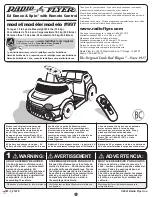
SLASH
•
21
Do not run your model with the
slipper clutch adjusting spring
fully compressed. The minimum
recommended slipper clutch
setting is 1/2 turn counter-
clockwise from fully compressed.
ADJUSTING YOUR MODEL
Adjusting the Slipper Clutch
The model is equipped with an
adjustable slipper clutch, which is built
into the large spur gear. The purpose
of the slipper clutch is to regulate
the amount of power sent to the
rear wheels to prevent tire spin.
When it slips, the slipper clutch
makes a high-pitch, whining noise. Remove the rubber slipper
clutch plug on the transmission cover in order to adjust the
slipper. Use the 4-way wrench to turn the adjusting nut clockwise
to tighten and counterclockwise to loosen. Place the model on
a high-traction surface, such as carpet. Adjust the slipper so that
you can hear it slip for approximately two feet from a standing, full
throttle start. (Learn more about adjusting the slipper clutch in the
sidebar.)
Motor and Gearing
There are two different types of aftermarket motors that can be
purchased for your model, stock and modified. Stock motors all
have the same wire thickness and number of turns around the
armature as governed by sanctioned racing organizations. They
are inexpensive and widely available. Modified motors are more
expensive, may feature ball bearings, and may come in a variety of
wire thicknesses and a number of turns of wire on the armature.
The fewer number of turns of wire on the armature, the more
powerful the motor will be. Keep in mind that the more powerful
the motor, the less battery run time you will have.
One of the more significant advantages to your model’s
transmission is the extremely wide range of available gear
ratios. It can be geared low enough to run an extremely hot,
modified motor. A modified motor should be geared lower
(higher numerically) than a stock motor because it will reach its
maximum power at higher rpms. A modified motor that is geared
incorrectly can actually be slower than a correctly-geared, stock
motor. Use the following formula to calculate the overall ratio for
combinations not listed on the gear chart:
If you are worried that you might be over-geared, check the
temperature of the battery pack and motor. If the battery is extremely
hot, and/or the motor is too hot to touch, your model is probably
over-geared. If you are not able to run your model for at least four
minutes before the battery dies, then change to a lower gear ratio.
This temperature test assumes that the model is close to factory stock
weight and operates freely with no excessive friction, dragging, or
binding, and the battery is fully charged and in good condition.
The model is equipped with a Titan 12T 550 motor. The gear
combination that comes stock on each model provides good overall
acceleration and top speed. If you want more top speed and less
acceleration, install the included high-speed gearing (more teeth).
If you want more acceleration and less top speed, use a smaller
optional (not included) pinion gear.
The included high-speed
gearing is intended for high-speed running on hard surfaces,
and this gearing is not recommended for off-road or repetitive
starting and stopping.
The Titan 12T is equipped with an integrated cooling fan that is
effective during medium to high-speed operation. The gearbox is
specially vented to cool the
motor. Repetitive starting and
stopping over short distances
creates excess heat and will
not allow the fan to cool the
motor properly. For this type
of driving, smaller pinion
gears are recommended to
reduce load on the motor.
Gearing Compatibility Chart
The chart to the right shows
a full range of gear combinations. This does NOT imply that these
gear combinations should be used. Over-gearing (bigger pinions,
smaller spurs) can overheat and damage the motor and/or speed
control. Items in black will fit 540 motor only (not Titan 12T).
Adjusting Gear Mesh
Incorrect gear mesh is the most common cause of
stripped spur gears. Gear mesh should be checked and
adjusted anytime a gear is replaced. To set the gear
mesh, cut a narrow strip of notebook paper
and run it into the gear mesh. Loosen the
motor screws and slide the motor and pinion
gear into the spur gear. Retighten the motor
screws and then remove the strip of paper.
You should be able to run a fresh strip of paper
through the gears without binding them.
Tighten
Loosen
# Spur Gear Teeth
x 2.72 = Final Gear Ratio
# Pinion Gear Teeth
Spur Gear
Pinion Gear
76
83
86
90
12
-
-
-
20.40
13
-
-
-
18.83
14
-
-
-
17.49
15
-
-
15.59
16.32
16
-
-
14.62
15.30
17
-
-
13.76
14.40
18
-
12.54
13.00
13.60
19
-
11.88
12.31
12.88
20
-
11.29
11.70
12.24
21
-
10.75
11.14
11.66
22
-
10.26
10.63
11.13
23
-
9.82
10.17
10.64
24
-
9.41
9.75
10.20
25
8.27
9.03
9.36
9.79
26
7.95
8.68
9.00
-
27
7.66
8.36
8.66
-
28
7.38
8.06
8.35
-
29
7.13
7.78
8.07
-
30
6.89
7.53
-
-
• Fast Acceleration
• Short Distances
• Small Tracks
14-Tooth Pinion*
90-Tooth Spur
• Good Acceleration
• Good Speed
• Normal Conditions
16-Tooth Pinion
90-Tooth Spur
• High Top Speed
• Long Distances
• Hard Surfaces
23-Tooth Pinion
86-Tooth Spur
*optional (sold separately)
Motor
Screws
Strip of
Paper
Stock
Included Optional
Usable Range
High Speed, Hard Surfaces Only
Not Recommended
-
Does Not Fit



































